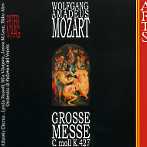This is a “serviceable” performance/recording of Mozart’s great, unfinished C minor Mass. And in a world–and “Mozart year”–flush with excellent recordings of this composer’s works, even the minor ones, that just isn’t good enough to warrant serious consideration. This concert performance from 1997 features disorienting, shifting balances that give prominence to a group of voices here, the orchestra there, and to random singers or instruments elsewhere. There’s a confined sense of space that suddenly opens up in some tutti sections. The choir is adequate, and at times we can be really impressed by the sense of occasion and the emotional impact created by the ensemble singing. But the orchestra’s uninspired, routine-gig manner doesn’t help sustain energy and tension where necessary, and conductor Peter Maag doesn’t have a handle on the work’s inherent drama, especially disappointing in the sloppy Qui tollis and the slogging Cum sancto spiritu. The soloists are generally very fine, particularly soprano Lynda Russell, but together the sopranos and tenor seem lost in the Quoniam tu solus Sanctus. Finally, even the miminally informative packaging looks as if no one cared to give much importance to this release–and neither should we.
































